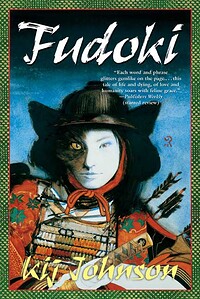Call number
Series
Genres
Publication
Pages
Description
In her skillful debut novel, Kij Johnson took the classic Japanese myth of the fox who dared to become a woman to win true love and created The Fox Woman, a luminous, lyrical tale of love, desire, joy, and the nature of the soul. Set in the same universe as The Fox Woman, this time Kij Johnson takes on another animal totem and enters the world of the creature who comes to be known as Kagaya-hime, a sometime woman warrior, occasional philosopher, and reluctant confidante to noblemen. And who may or may not be the figment of the imagination of an aging empress who is embarking on the last journey of her life, setting aside the trappings of court life and reminiscing as she follows the paths that are leading her to the nunnery and death. Fudoki is the tale of a being who starts her journey on the kami, or spirit road, as a humble-if ever a being such as a Cat can be humble-small tortoiseshell feline. She has seen her family destroyed by a fire that decimated most of the Imperial city. This loss renders her taleless, the only one left alive to pass on such stories as The Cat Born the Year the Star Fell, the Cat with a Litter of Ten, the Fire-Tailed Cat. Without her fudoki-self and soul and home and shrine-she cannot keep the power of her clan together. And she cannot join another fudoki because, although she might be able to win a place within another clan, to do so would mean that she would cease to be herself. So a small cat begins an extraordinary journey. Along the way she will attract the attention of old and ancient powers, including gods who are curious about this creature newly come to Japan's shores, and who choose to give the tortoiseshell a human shape. And who set her on a new kami road, where Kagaya-hime will have to choose a way to find what happiness she can. Weaving a haunting story of one being's transformation and journey of discovery with the telling of another's long life set against the backdrop of the courtly rituals of Imperial power, Kij Johnson has written a powerful novel about the nature of freedom and the redemptive power of transformation--if only one is brave enough to risk it all.… (more)
Awards
Language
Original language
Physical description
ISBN
Similar in this library
User reviews
Gorgeously written, with two compelling main characters in the tamed princess Harueme and the untamable cat-girl, Fudoki is luminous and absorbing. Highly recommended.
But once I got past the slow pace, I was really impressed with this as a contemplation on place—the idea of one's social place, place as a physical location and the intersection of these ideas that construct our sense of ourselves (Fudoki). Harueme is a princess—daughter, grandaughter, sister and aunt to emperors. But this same high rank (place in society) is a prison of sort, keeping her in her place dreaming of being free, of seeing the world and new places. She is never allowed to escape her place, physical or cultural. While simultaneously, Hime is a cat who has lost her Fudoki, her place and therefore the sense and understand of self that it provided. She spends the whole book looking for a place to be her and her own.
If you're looking for a contemplative read and have any interest in 11th century Japanese culture I recommend picking this one up.
